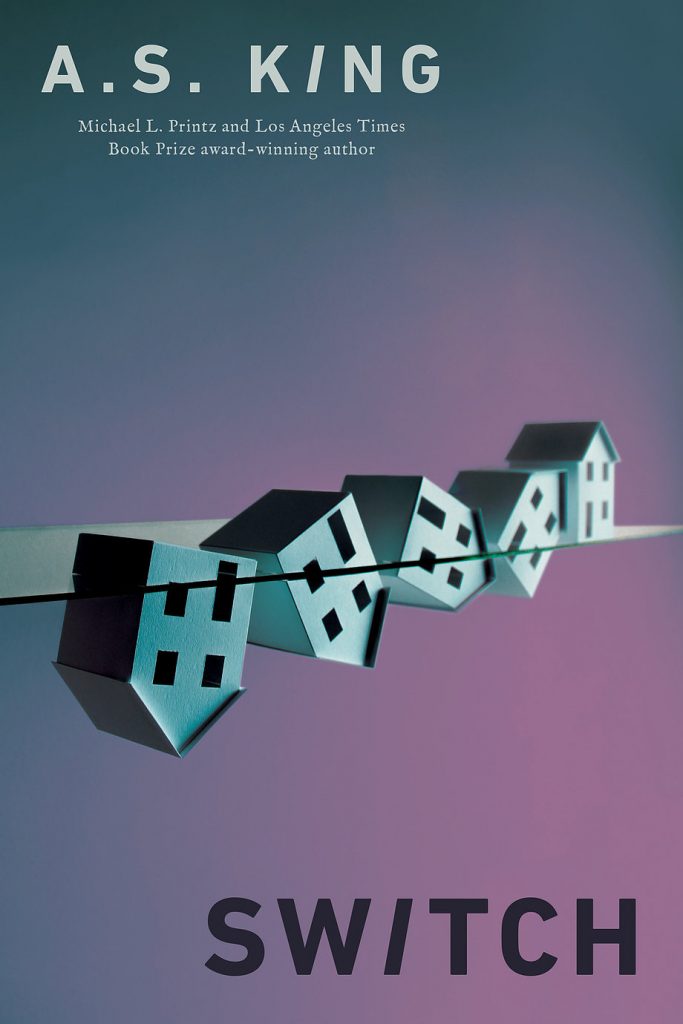10 days ago, I was in Lititz, PA. It is a cute little town with an AMAZING independent bookstore, Aaron’s Books. Aaron’s Books is a small store, but it is beautifully curated. I found myself needing to practice restraint, or I would have blown all my vacation money in one spot. I left Aaron’s with the newest Nicola Yoon–signed edition–the newest Julie Murphy–also a signed edition–three Selena Montgomery paperbacks, and the newest A.S. King–also signed. In fact Aaron’s is Amy King’s local bookstore, so they had every single one of her books signed.
I’ve been a King fan since I read Ask the Passengers almost a decade ago. While her style is always pushing boundaries, her protagonists leap off the page with a strong, authentic voice. King never talks down to her readers; she trusts them enough to know that they don’t need their world explained to them. They’re busy figuring it out, and in some cases, they’re figuring it out better than the adults around them.
Her newest book, Switch, immediately grabbed my attention because it focused on a worldwide crisis. Not COVID, but instead time has stopped (which really could be about COVID after a year of sheltering in place). The adults don’t know what to do and expect the kids to find a solution.

When I started reading, I could see the beauty of the novel. Yes, there is the literal stoppage of time in the novel. But in true King fashion the time stoppage is more metaphorical than anything else. Everything from the protagonist’s name, Truda, to her javelin career, to the spinning house, has some sort of symbol or metaphor with it.
On the first pages of the novel, the reader finds themselves in the Becker home. A home where time–at least emotional time–has stopped for the entire family. Tru’s father has been busy constructing boxes in the house, and Tru, her father, and her brother, all live in their own boxes. Tru refers to going in and out of her box as going through a “me shaped hole” to get into her room.
The reader quickly sees that Tru, her brother Richard, her father, and her estranged mother are all dealing with trauma. A trauma brought about by Sister–Tru’s unnamed mentally ill older sister who holds the entire family hostage. And these boxes are both literal and metaphorical all at the same time. The scene where Tru lets her best friend Carrie into her house is both beautiful and poignant. The reader sees the boxes through someone else’s eyes for the first time. And Carrie’s reaction to Tru’s house helps the reader forgive her later when she behaves like a typical teenage girl.
The more she works on her thesis, the more she starts to really look at her family and what’s wrong with them. It also forces her to look at her role in the family as well. In the end, Tru realizes they can’t stay in their own boxes doing their own thing. They have to work together, listen to each other, and sometimes do difficult things in order to help the people you love. “Flip the pancake / take the tampoes de ouvido out of your ears / hear everything / listen” (King 233). Sometimes the hardest thing to do is actually listen.
At the end of the novel, King writes, “Breaking news / you are the energy. Breaking news / here is the switch” (225). Tru has found her voice and a way to help the people she loves. And then the voice switches from first person to second, with Tru–or King–talking directly to the reader. Sending them out to find their power and their voice.







